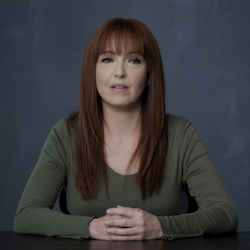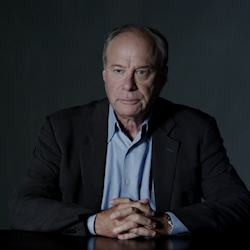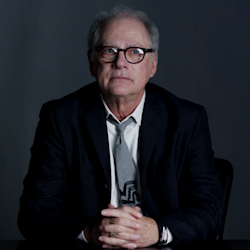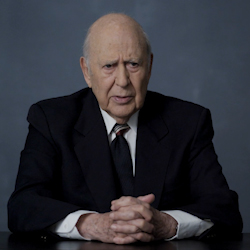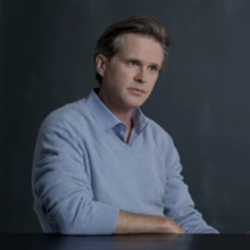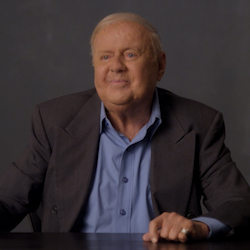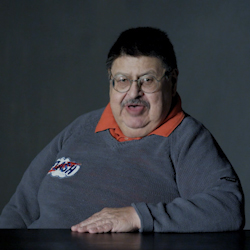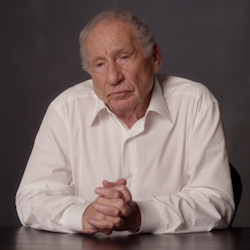Interviewer: What did the success of Get Smart do for you?
Mel Brooks: It paid the rent. The success of Get Smart paid the rent? I was able to propose to Anne Bancroft and get married August 5th, 1964. City Hall. Nobody there but Ann and I. And there was there was this black kid who had stood up for his friend to get married. His name was Boon Samuel Bowen. And I said, Sam, we don’t have a best man or anything. Could you stand up for us? He said, Yeah, sure. And he said, But I want to warn you. Don’t break up because the clerk who marries you has an insanely funny voice. I said, wow, Bob, you know, we’re in trouble. We could deal with that. You know, whatever it is.
Speaker So we get in front of this clerk and declensions to you and Marie-Louise Italiana. Take Melvin Kaminsky Brookton. And we were on the floor. We had to rise up again and face him and look away from each other. And we couldn’t we couldn’t look at that Samuel Boone, because he was real. And anyway, we got married in that fashion.
Interviewer: Well, you said it’s important, too, to fail. Between the ages of 20 and 30. What why is that, do you think?
Mel Brooks: Did I really say that?
Interviewer: Yes.
Mel Brooks: Did I say I don’t have a date? I said it was important. Katamon.
Interviewer: Important to fail. Between the ages of 20 and 30. You can take it back.
Mel Brooks: No, no, no, I think I think I knew what I was talking about, but success is like sugar. It’s too good. It’s too adoro. It’s too sweet. It’s too wonderful. And it burns up very quickly. Failure is like corned beef hash. Takes a while to eat. Takes a while to digest. And. But it stays with you. Failure is good. And failure always sharpens your mind. You know, like where did I go wrong? Why didn’t this screenplay or this sketch or this. One act play. Why didn’t this work? And there’s always reasons you can’t just say, well, it’s not funny. It’s because and then you realize when you’re a writer. Well, what is the character? What does he want? Who is he? What does he need? What does he want? Why does he love this girl? What is her opposite, miss? That really helps him and attract him. And so failure helps you think fair, you know, after that you wipe away your tears. It’s not a bad it’s not a bad thing. And I failed. I went to, you know, the Borscht Belt in the mountains. And I had plenty of failures, many, many jokes. And the great thing about that is I’ll never do that joke again. I doubt it. So you learn. You learn what they expect, what they want, and then you have to learn a bigger lesson. Don’t give them what they want and what they expect. Give them what they don’t know and what they don’t expect. And maybe it will be a bigger explosion. So you’ll learn a lot. But, you know, I think failure is a very important failure is an incredibly important quotient in the equation of a career of growing up. I think it’s important. Go out there. My my son Max said at a graduation ceremony once at Pitzer, where he went to undergraduate school. He said, go forth and fail. You know, he did a whole thing about failure. And I think he was absolutely on target because it sharpens you.
Interviewer: How do you how do you personally insulate yourself against that, the fickleness of the critics and the public over the years?
Mel Brooks: Oh, by the way, my son Max wrote the Zombie Survival Guide. Which is a terrific book. And he also wrote World War. He’s a fairly writer. He wrote World War Z, which Brad Pitt is in the process of making as as a big tent pole picture about zombies taking over the world and now the world takes it back. So Max’s is a terrific number. He’s a very good writer and he’s a much better writer than I am because I never had the knack of description and narrative to any great degree. I’m a genius at dialogue. I admit that. But but, you know, I really don’t have description, event, that kind of stuff. And Max, as it is, he’s really gifted. What were you saying?
Interviewer: How do you insulate yourself against the fickle after quite a long years now, ups and downs. How do you insulate yourself against the fickleness of the critics and the public?
Mel Brooks: How do I insulate myself against it? I can’t. You can’t. Every bad review, just as a knife plunging through your heart. Every year, there’s no way of even. Just recently, we’ve got a very good review. From a guy called Charles McNulty in the L.A. Times for the producers at the Hollywood Bowl. But there were two little peccadilloes. He wasn’t happy about this, he. And I said it never ends. No matter who they are. What right has he got to do anything but say God bless you and thank you? That’s the review. But no, there was this could have been better. That would curb your butt. That’s their job. Their job is is to praise you and pick on you. And then you’re lucky if you get more praise than picked apart, you know. But it’s good. It’s good. Critics, they have a job and I dunno what the job is, but it’s a job. And I remember when I did. Jesus it was such a thrill to get even as a creative artist. I did a movie called History of the World, Part one. And I started with cavemen and Sid Caesar played a cave man and he made a cave painting. A beautiful bull with horns and one eye on a cow on a cave wall. And Orson Welles, God bless him. The narrator of the movie said and then was born The Artist. And a guy comes up in an in and a bare skin or something and takes out his penis and pees all over, it just keeps peeing all over. And then he said. And after the birth of the artist, the inevitable after birth, the critic and I don’t think they’ve ever forgiven me for, you know, for that for that scene, but it was so good to get it off my chest. I mean, I did it for every writer that ever wrote anything, for every director, for every actor.
Interviewer: But it going about even beyond the critics. Because we were talking earlier about Chaplin, Keaton, the Marx Brothers. It’s all impossible. It ebbs and flows. Right.
Mel Brooks: I have no answer for that. If you keep doing something after a while, the public will get tired. The critics will get tired. The world will get tired. And you have to be dead about 60 to 150 years. And some might say, hey, you know, like, I was really good, you know? And then there’s is a renaissance of appreciation for the best of your work. I mean, but but, you know, the public is and has every right to be fickle. You know, if you do. 20 things in a row by the you know, by the 20th event that you accomplish, it’s going to be bad, but, you know, you’re going to have to really. What I try to do is outguess the public in the world, not work for a while, and then do something that I think is explosive and dangerous and sometimes, you know. What did Scott Fitzgerald say? There are no second acts, right? Well, I’ve been lucky. Scott, you were wrong. I have. Had a good second act, and I’m enjoying a pretty good third act. But, you know, I can’t expect much more. You know, I’m very grateful for whatever little success is happening. Manteno.
Interviewer: Now, actually, we’re talking about that with Rob Reiner. And he said if he’s going for a Shakespearean sort of a thing, he’s got five acts.
Mel Brooks: Oh, yeah.
Interviewer: He’s got two more acts coming.
Mel Brooks: Well, that’s great. I mean, if we you know, if it’s Shakespearean. But unfortunately, I think we’re down to two acts. And I’m I’m still dog paddling, keeping my nose above water.
Interviewer: You know, you you said that essentially your job is spotting the insane or the bizarre in the commonplace.
Mel Brooks: Did I say that?
Interviewer: Yes.
Mel Brooks: That’s very good. Very good. I’m proud of that. I don’t remember saying it, but I’m glad I said it. Spotting the insane and the bizarre and the commonplace. I’d give myself a pat on the back for that. But it’s true. You’ve got to see. I mean, among all the little creatures, you got to see a ladybug orange with little spots and. That’s a beautiful little bug. It’s not just a cricket. It’s not just a beetle. It’s a ladybug. You’ve got to be able to spot those ladybugs and celebrate them.




